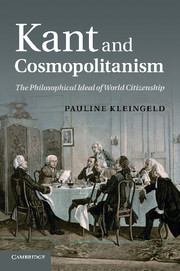Book contents
- Frontmatter
- Contents
- Acknowledgments
- Abbreviations and main primary texts
- Introduction
- Chapter 1 Kant and Wieland on moral cosmopolitanism and patriotism
- Chapter 2 Kant and Cloots on global peace
- Chapter 3 Kant’s concept of cosmopolitan right
- Chapter 4 Kant and Forster on race, culture, and cosmopolitanism
- Chapter 5 Kant and Hegewisch on the freedom of international trade
- Chapter 6 Kant and Novalis on the development of a cosmopolitan community
- Chapter 7 Kant’s cosmopolitanism and current philosophical debates
- Bibliography
- Index
- References
Chapter 4 - Kant and Forster on race, culture, and cosmopolitanism
Published online by Cambridge University Press: 05 November 2011
- Frontmatter
- Contents
- Acknowledgments
- Abbreviations and main primary texts
- Introduction
- Chapter 1 Kant and Wieland on moral cosmopolitanism and patriotism
- Chapter 2 Kant and Cloots on global peace
- Chapter 3 Kant’s concept of cosmopolitan right
- Chapter 4 Kant and Forster on race, culture, and cosmopolitanism
- Chapter 5 Kant and Hegewisch on the freedom of international trade
- Chapter 6 Kant and Novalis on the development of a cosmopolitan community
- Chapter 7 Kant’s cosmopolitanism and current philosophical debates
- Bibliography
- Index
- References
Summary
Most of the old divisions of the human species have long been rejected anyhow. Noah’s sons, the four parts of the world, the four colors, white, black, yellow, copper red – who still thinks of these outdated fashions today?
Georg Forster, “Guiding Thread for a Future History of Humankind,” 1789, 8:193Introduction
In 1788, shortly after the publication of the Critique of Practical Reason, Kant published an essay in which he claimed that people from Africa and India lack a “drive to activity.” Without the mental capacities to be self-motivated and successful in northern climates, they never become anything more than drifters. Kant writes that nature, whose wisdom he praises, discourages the migration of races across the globe by making them ill-equipped to change from one climate zone to another, and “especially [for] the exchange of a warm climate for a cold one” (TPP 8:173). He adds a footnote in which he endorses a pro-slavery text, citing with approval the criticism of a “knowledgeable man” who opposed a proposal to free black slaves on the basis of their incapacity for self-motivated activity (TPP 8:174 n.). They can work, but they cannot make themselves work. Native Americans, he goes on, are a race (or rather, a semi-race) stunted in its development because their ancestors migrated to a different climate before they had fully adapted to their earlier environment. As a result, they are weak, inert, “incapable of any culture,” and they occupy the lowest level of the racial hierarchy that Kant claims to have determined:
That their temperament has not become entirely adequate to any climate can also be inferred from the fact that it is hard to point to any other reason why this race, which is too weak for hard labor and too indifferent for industrious work, and which is incapable of any culture even though there are enough examples and encouragement in the vicinity [namely, the example of the European colonial settlers], stands far below even the Negro, who occupies the lowest of all other levels which we have mentioned as racial differences. (TPP 8:175–76)
Kant’s unstated assumption, made explicit elsewhere, is that “whites” occupy the top level of this hierarchy.
- Type
- Chapter
- Information
- Kant and CosmopolitanismThe Philosophical Ideal of World Citizenship, pp. 92 - 123Publisher: Cambridge University PressPrint publication year: 2011



